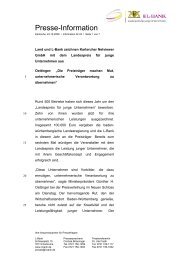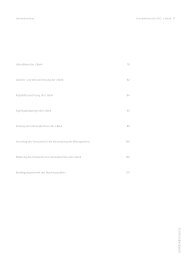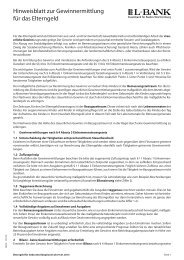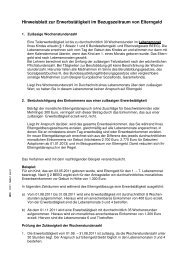Landeskreditbank Baden-Württemberg - L-Bank
Landeskreditbank Baden-Württemberg - L-Bank
Landeskreditbank Baden-Württemberg - L-Bank
You also want an ePaper? Increase the reach of your titles
YUMPU automatically turns print PDFs into web optimized ePapers that Google loves.
Loan Portfolio Risks<br />
We maintain a policy of conservative evaluation of our loan portfolio. We establish what we believe to be<br />
adequate reserves to take account of all identifiable risks in our loan portfolio.<br />
At year-end 2004, 54.0% of our total outstanding loans (other than fiduciary loans and administrative loans)<br />
and guaranties were backed by credit support, (compared to 56.4% at year-end 2003): 34.6% of total loans<br />
(compared to 37.9% at year-end 2003) were secured by mortgages and other collateral and 19.5% (compared to<br />
18.5% at year-end 2003) were loans to, or guarantied by, the Federal Republic of Germany or <strong>Baden</strong>-<br />
Württemberg, political subdivisions thereof or other governmental authorities, or were insured.<br />
According to our internal guidelines determined by the board of management direct lendings generally have<br />
to be secured, unless the debtor is, or is guaranteed by, a Member State of the European Union, a municipality or<br />
by another public law entity of a Member State of the European Union, or if the debtor is a company engaged in<br />
the utility sector and the majority of its equity is owned by any of the public law entities mentioned before.<br />
Furthermore, credit support may not be required, if the debtor has a high degree of credit-worthiness and other<br />
credit institution would normally extend loans to this company on an unsecured basis. We have established an<br />
internal rating framework and each debtor is classified according to a predefined rating methodology suitable for<br />
the category of debtors to which the debtor belongs. As a general rule, credit support is not necessary, if the<br />
debtor is classified in one of the two highest internal rating categories.<br />
At December 31, 2004, most of our loans and guaranties not backed by credit support were made to banks<br />
and other credit institutions.<br />
As part of our lending in support of housing and agriculture, we make fiduciary loans, which are loans in<br />
our name on behalf of other entities, and administrative loans, which are loans in the name of other entities on<br />
behalf of the other entities, in each case using funds supplied by other entities. We do not bear any credit risk in<br />
connection with fiduciary loans and administrative loans. See “General—Introduction” and “—Glossary—<br />
Fiduciary assets; fiduciary liabilities.”<br />
In accordance with the L-<strong>Bank</strong> Statutes, if loans and guaranties extended by us are secured, they are<br />
generally secured on a junior basis. Housing-related loans are usually secured by junior mortgages or, on a<br />
temporary basis until the perfection of a mortgage, by bank guaranties or guaranties by local authorities or<br />
entities established under public law. Bridge loans to persons with an unmatured building-society savings<br />
contract (nicht zuteilungsreifer Bausparvertrag) are additionally secured by an assignment of such contract.<br />
Because of the risk inherent in junior mortgages, the municipality in which the housing construction is located is,<br />
subject to its prior approval, obligated by law to cover one-third of any losses incurred by us, provided that the<br />
relevant loan is granted under the State Housing Program and is used for the construction of houses or<br />
apartments. A <strong>Baden</strong>-Württemberg state administrative regulation, however, limits our claims under the guaranty<br />
to an amount based on a ratio of 75% of the overall reasonable cost.<br />
In certain areas of financing, such as trade-, industry- and agriculture-related lending, we very frequently<br />
extend loans through intermediary banks that on-lend the funds to their own borrowers — the end customers. In<br />
addition to assuming the credit risk, we generally require intermediary banks to secure such loans. To a very<br />
limited extent we may guaranty collection of loans made by intermediary banks. Trade and industry-related loans<br />
are in most cases secured by mortgages or security interests in equipment, accounts receivable and other<br />
collateral.<br />
In various areas of our business we make loans, including fiduciary loans, to entities and, to a limited extent,<br />
to individuals — German and foreign — that are incorporated or located outside of Germany, purchase debt<br />
securities of foreign issuers and make equity investments in foreign entities. To the extent these transactions are<br />
not denominated in Euros, we generally hedge any currency risks by means of currency swaps. See “Business—<br />
Funding and Investment Policy.”<br />
16
















